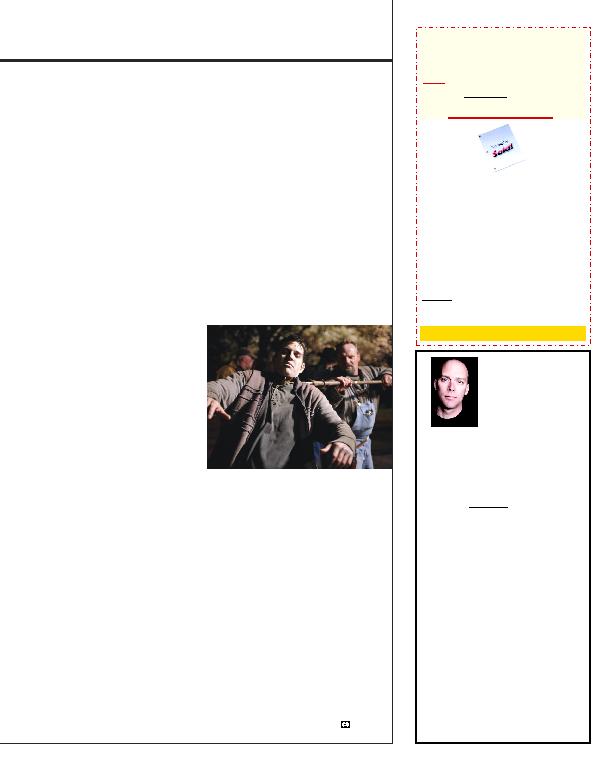
start to write. We've been known to lock
ourselves away for days at a time and really
pound on something. He's a great foil. I find
it very easy to work with him." Romero
pauses and, chuckling, adds, "And some-
times frustrating, because his ideas are good
and his complaints are always valid. Once
we start to shoot I have a whole family -- a
director of photography, a wardrobe de-
signer, an editor -- whom I work with once
the project's up and going. Occasionally, I'll
talk to some of those people during the
script stage, but never as intimately. It's all
Peter, in terms of the early stages."
doons. The fight between the two families
almost takes precedence over what they're
fighting about: the walking dead. Romero
admits that to a small degree some of the
story grew out of the very angry, partisan
nature of our times. "People can't disagree
without being disagreeable," he muses.
"Anger is permitted now." Though filming a
number of acts of rage and rudeness sparked
much discussion on set, the filmmaker in-
sists the highly politicized nature of this
conflict was not at the core of the script
when he sat down to write it. "This film re-
ally isn't about what's happening today,"
Romero says. "Unlike all of the other [films]
-- which spoke much more about the times
-- this one is just much more general. It's
about war and people unable to lay down
their hatreds and enmities."
give the story more of a timeless feel. "The
script was almost finished when I remem-
bered this old Western called The Big Coun-
try," Romero recalls. "I told all the crew
people to watch this movie." On the island
that serves as much of the film's setting
there are no cars, O'Flynn's daughter Kate
is often seen riding her horse and the lo-
cals are armed with six-shooters and hunt-
ing rifles. "I was able to indulge myself
with that," Romero says. With a laugh, he
also admits that the freedom his deal with
Artfire gave him may have been a bit of a
liability. "There's nobody else to blame but
me," he says. "I know I did some real
loony tunes, silly stuff in this movie. The
idea of turning it almost into a Western?
Maybe I went too far over the line, but
we'll see. Fans seem to dig it."
by Muldoon, each depicting a portrait of
an ancestor after his or her death. "People
used to do that," Romero says. He admits
he's always been fascinated with the idea
that people would take "final photo-
graphs" not only of celebrities but of fa-
vorite uncles, grandparents and children
in an eerie attempt to hang onto these rel-
atives after their deaths. The idea came to
him when he was writing a speech for
Muldoon, where the patriarch explains to
a captured Guardsman (Athena Karkanis)
his decision to shelter and save the un-
dead. "It's the perfect justification for what
he's trying to do."
to work on the next two Dead movies in
what he hopes will be a tight quartet of
making two more films, the other two
characters we know a little more about,"
he says. "One would be a group of looters
that the kids [from Diary] ran into. And
then I was thinking about the blonde who
got away at the end of Diary. I don't know
if this stuff is going to happen or not, But
I do have ideas and I already know what I
would do with these two films."
screenwriting career. "I'd love to do some-
thing else, but it's so easy having the cre-
ative control and being able to work with a
family of friends," Romero says. "It's no
stress. I don't know if I want to go back
into that development business. At my age,
it's tough to think about that. These cou-
ple of projects that we're working on are
things that I really love, so I think I could
get up a good fight to do them."
story "pitcher"
days or less
writer in 12 months or less
script or movie idea
"II ssoolldd m
sccrriipptt iinn 1199 ddaayyss ffoorr
$331100,,000000 tthhaannkkss ttoo
crriittiiqquuiinngg,, rreewwrriittiinngg,,
anndd ccooaacchhiinngg eexxppeerrttiissee!!"" ~~SSccootttt VV..